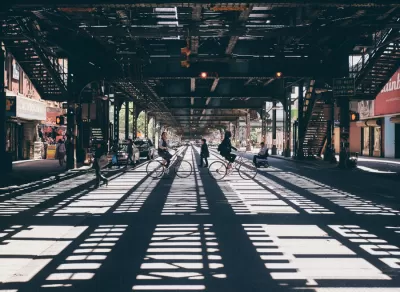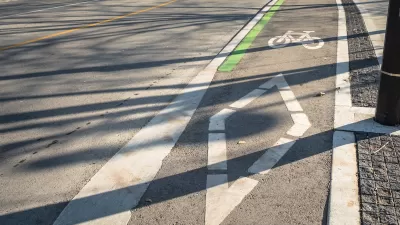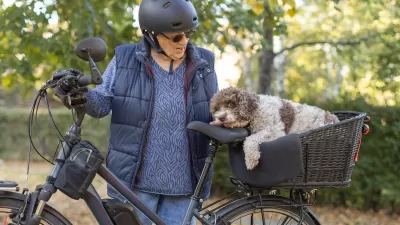Those in search of high-tech solutions for urban congestion and pollution often overlook the bicycle as a powerful, if simple, tool for reducing both and improving urban transportation.

Writing in Next City, Nicolas Collignon argues that it isn’t autonomous or electric vehicles that can change the future of transportation, but rather a much simpler technology: the bicycle. “Sparked by the pandemic, supported by people waking up to the climate crisis and now fuelled by the rising price of oil, we’re living through a bicycle renaissance,” Collignon writes.
Yet a “gap between our imagined future, the promises of techno-kings and the realities of progress” persists. To Collignon, this is in part due to the exciting future visions promised by technologists. But every flying car or delivery robot comes with its own massive set of implications for infrastructure and society. “When we begin to see technology through the lens of systems, it becomes clear that genuine technology-led progress will focus on dealing with the accelerating complexity of today’s world, not increasing the complexity of our tools.”
When it comes to bicycles, Collignon points out that while they are often more efficient and nimble, their very speed and flexibility prevent them from being easily quantified and “optimized” by algorithms. We don’t need to revolutionize the bicycle, “the fastest, most energy efficient, resilient, and lowest carbon emitting urban vehicle,” Collignon writes, but rather change the lens through which we view and organize urban mobility flows.
FULL STORY: Bikes, Not Self Driving Cars, Are The Technological Gateway To Urban Progress

Manufactured Crisis: Losing the Nation’s Largest Source of Unsubsidized Affordable Housing
Manufactured housing communities have long been an affordable housing option for millions of people living in the U.S., but that affordability is disappearing rapidly. How did we get here?

Americans May Be Stuck — But Why?
Americans are moving a lot less than they once did, and that is a problem. While Yoni Applebaum, in his highly-publicized article Stuck, gets the reasons badly wrong, it's still important to ask: why are we moving so much less than before?

Using Old Oil and Gas Wells for Green Energy Storage
Penn State researchers have found that repurposing abandoned oil and gas wells for geothermal-assisted compressed-air energy storage can boost efficiency, reduce environmental risks, and support clean energy and job transitions.

Minneapolis Bans Rent-Setting Software
Four cities have enacted restrictions on algorithmic software that can inflate rent costs.

Oakland to Add 244 New EV Chargers
Oakland plans to launch its new charging network at eight locations by the end of 2025.

Jane Goodall Inspires with Message of Hope, Resilience, and Environmental Action
Speaking in Pasadena, Jane Goodall offered a hopeful and inspirational message, urging global compassion, environmental responsibility, and the power of individual action to shape a better future.
Urban Design for Planners 1: Software Tools
This six-course series explores essential urban design concepts using open source software and equips planners with the tools they need to participate fully in the urban design process.
Planning for Universal Design
Learn the tools for implementing Universal Design in planning regulations.
Heyer Gruel & Associates PA
City of Moreno Valley
Institute for Housing and Urban Development Studies (IHS)
City of Grandview
Harvard GSD Executive Education
Salt Lake City
NYU Wagner Graduate School of Public Service
City of Cambridge, Maryland





























